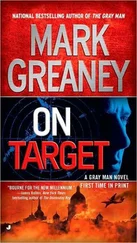The North Korean did speak now, but it was low and guttural and in Korean. He was talking to his partner, and while Chavez thought he might have just been translating for his partner’s benefit, it didn’t sound good at all.
The guns wavered a little as the train began a bumpy curve to the left, but still four muzzles were pointed at four faces, and four trigger fingers took up the slack in four triggers.
A female tourist in her thirties started to say something, but Caruso just hushed her without looking.
Chavez said, “Why don’t you two lower your weapons and you walk out of here at the next stop? We’ll let you do it. Matter of fact . . . we’d love for you to do it.”
The leader of the two shook his head no. Sweat drained down his temples.
The train began to slow for the 8th Street stop. In a voice that was demonstrative but cautious, because he didn’t want to startle the dude with the gun in his face, Dom said, “Everybody relax. I’m a federal officer. Nobody move until we’re stopped, but as soon as the doors open I want everyone to leave the train in a quiet and orderly fashion.”
The North Korean said, “No! No! No one leaves!”
Chavez said, “If either of you take your guns off of us to point them at these civilians, we will shoot you dead.” That sank in for a moment, then Chavez added, “Tell your buddy if he doesn’t understand.”
A college-age man sitting on the bench behind Dom said, “Sir, do you want me to—”
Caruso said, “I want you to do exactly what I just said. Nothing else.”
The subway car was quiet other than the rattling of the movement over the tracks, but when Caruso heard sounds behind him, a slight shuffling of clothing or a purse, he said, “Anybody who pulls out a camera phone will probably get themselves killed, but if you don’t, I’m gonna throw your ass in prison. Stay still!”
The sound behind ceased instantly.
It was a jolting stop at 8th Street; all four men stumbled a little, but the guns were back up and in their X in an instant. The men and women on the train—fortunately, it was late enough at night that no children had been on board—behaved even better than Dom had expected, and in seconds the train was clear.
Marleni Allende was one of the first off. Caruso and Chavez noticed that the North Koreans, though obviously on a life-or-death mission, had the good sense to not try to stop her. They were focused on their difficult predicament.
Caruso expected the train to stay at 8th Street. Surely someone would tell the motorman that there was an armed standoff on his train, and he’d sound the alarm and stay right there. But the doors closed and it began moving again.
He realized they were in the second-to-last car, and perhaps the people who’d scrambled off had been more concerned about getting the hell out of the line of fire and going to the exits and less concerned about running all the way up the platform to the front of the train.
Of course, everyone would be on their mobiles once they got to street level, or else they would tell the first transit cop they came across, so both Caruso and Chavez knew the train wouldn’t make it past Union Square, the next stop.
Chavez tried his hand at dialogue again. “The woman is gone. We can shoot it out over nothing, or we can just call it a night.”
The North Korean said, “We have diplomatic immunity.”
Caruso replied, “Who doesn’t, really, at this point?”
Chavez latched on to this. “Then drop your guns. You haven’t done anything that will get you more than an expulsion. It doesn’t have to end bad.”
The sweat on the Korean’s face made him blink, over and over.
His partner said something in Korean, and the two men started some sort of argument that got heated.
While they shouted at each other, getting more volatile by the second, Caruso spoke softly to Chavez. “They’re losing it.”
Chavez said, “Talking over the consequences of failure.”
Dom took in a slow breath. “Dead-enders.”
Chavez knew what he meant. These guys were coming to the realization they had nothing to lose, and this meant, to both of the Campus operators, they were in the same predicament.
There was going to be a point-blank shootout in a minute, and Chavez and Caruso had nothing to lose at this point, either.
The North Koreans had stopped their arguing, and both Americans took that to mean they had reached a conclusion. The train began to slow at the Union Square station, and all four men softened their knees to absorb the inevitable shift in momentum that came along with pulling into the stop. Although they couldn’t communicate it to each other, the Campus men both felt certain the North Koreans were going to fire right as the train made its final jolt before the doors opened. That was their best opportunity for success, and their best opportunity for escape.
Chavez said, “You trust me, Dom?”
It took Caruso a moment, but soon enough he thought he understood. “I trust you.”
“What are you saying?” shouted the English-speaking North Korean.
“I’m saying I give up,” answered Chavez.
He took his left hand off his gun slowly, and held it up in front of him, like he was telling the man with the gun on him he was going to surrender. Slowly he turned his pistol barrel away, changing his grip on the Glock so the gun rolled forward on his trigger finger. It hung upside down in his hand, the grip facing away from him. He turned away from the man he had been aiming at, and toward the man directly in front of him. “Here. Take it.”
As he said this, the man in front of Chavez, the one with the gun pointed at Caruso, took his eyes off his sights for an instant to look up at the man offering his gun to him. A change in the dynamic caused him a half-second of surprise as he reevaluated the situation.
As soon as his eyes shifted, Dominic Caruso swiveled his body to the right and shot the other North Korean, the man with the gun on Chavez, in the forehead.
The man with the gun pointed at Caruso startled at the movement, and his eyes flicked back toward his gunsight. He recognized he’d been caught off guard, looking at one man and aiming at another, but he was still on target, and he jerked his finger against the taut trigger of his semiautomatic.
But he never got a shot off.
Chavez flicked his pistol around in his hand so the grip was in his palm and his pinkie finger was inside the trigger guard. Though the weapon was upside down, the barrel pointed at the aggressor in front of him. He pulled his pinkie back and fired the pistol upside down. The round hit the North Korean in the upper chest and knocked him backward. He stumbled back, and his gun fired once into the ceiling of the train.
Dom Caruso swiveled his Smith & Wesson to the falling man and shot him twice more before he hit the floor.
The train lurched to a stop. Out the windows on the platform the two Campus operators saw a sea of dark blue uniforms running down the staircase twenty-five yards away. The police weren’t sure which car they were going for, so there was confusion at the bottom of the stairs.
Chavez turned toward the back of the train, away from the police, and started running. “We’re going for the tunnel!”
They leapt down to the tracks in the gap between the last two cars. Careful to avoid going anywhere near the third rail, they took off to the south.
Two cars behind them, the transit police held their weapons on all the cars. It would be thirty seconds before they boarded and another minute and a half before they suspected someone had left the train to run through the tunnel.
By then Caruso and Chavez were halfway back to 8th Street.
—
By the time they got to the 8th Street station, Caruso and Chavez had moved to the southbound side of the tracks. Since all the witnesses had climbed out of the subway car onto the northbound platform, the two Campus men expected there would be a police presence at the scene there, and they were right. A dozen or more police in light blue and dark blue uniforms, some carrying carbines or submachine guns, stood around with witnesses and other passersby.
Читать дальше












